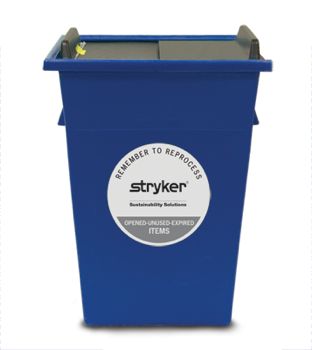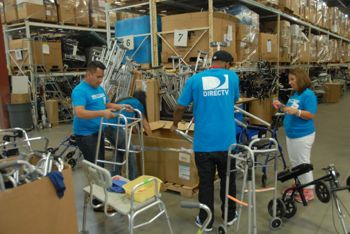
Hospitals produce large volumes of blue sterile wrap waste as a byproduct of surgical kits used in the operating room. Courtesy of the city of Dallas.
Oct. 28, 2015
According to the book Greening Healthcare, the U.S. health sector is second only to the food industry in contributing to waste production.
 Aware of this statistic, the city of Dallas waste management department realized that if it was going to achieve its zero waste goal by 2040, it needed the buy-in of one of its largest producers of landfill waste. So the city is hosting a Waste Diversion Stragedy seminar aimed at the healthcare industry on Nov. 9 from 10 a.m. to noon at Dallas City Hall.
Aware of this statistic, the city of Dallas waste management department realized that if it was going to achieve its zero waste goal by 2040, it needed the buy-in of one of its largest producers of landfill waste. So the city is hosting a Waste Diversion Stragedy seminar aimed at the healthcare industry on Nov. 9 from 10 a.m. to noon at Dallas City Hall.
The event will provide examples of waste diversion best practices and networking opportunities for anyone working in the healthcare industry involved with waste diversion, sustainability, asset management or purchasing.
Stryker provides bins for donated medical items to its clients.
Speakers will include Dallas City Councilmember Jennifer Gates, RN; director of Sanitation Services Kelly High; director of procurement for Project C.U.R.E. Hamish Walker; director of Sustainable Business Solutions for UT Southwestern Dr. Valerie Shoup; sustainability coordinator for Parkland Health and Hospital System Miranda Skaaning; and waste stream coordinator for Parkland Health and Hospital System Emma Donachie.
According to organizer Patricia Davis, a waste diversion specialist for the city of Dallas, there is no mandatory recycling ordinance for businesses in Dallas yet like there is in Austin. However, the North Texas medical industry has already taken steps to reduce waste.
For example, according to a city of Dallas webpage on healthcare recycling, hospitals produce large volumes of blue sterile wrap waste as a byproduct of surgical kits used in the operating room. Blue wrap is not reusable and immediately becomes waste if a recycling program is not available.
In 2010, Parkland Hospital began using reusable hard cases in place of blue wrap. Since instituting the program, waste associated with wrapping sterilization kits has decreased by about 95 percent.
 Davis said so far, the healthcare community has shown interest in the Nov. 9 seminar, and she's received more than 50 RSVPs from local healthcare professionals from Fort Worth to Mesquite.
Davis said so far, the healthcare community has shown interest in the Nov. 9 seminar, and she's received more than 50 RSVPs from local healthcare professionals from Fort Worth to Mesquite.
Volunteers move donated medical supplies at Project C.U.R.E.
At the event, attendees will have time to network, share best practices and learn from industry reps from companies that recycle or repurpose medical waste, such as Stryker, Stericycle and Project C.U.R.E., as well as electronics recycling companies and waste haulers.
“Hopefully this will peak increase and increase dialogue,” said Davis. “People can learn there are more opportunities for recycling than just paper, plastic and aluminum.”









